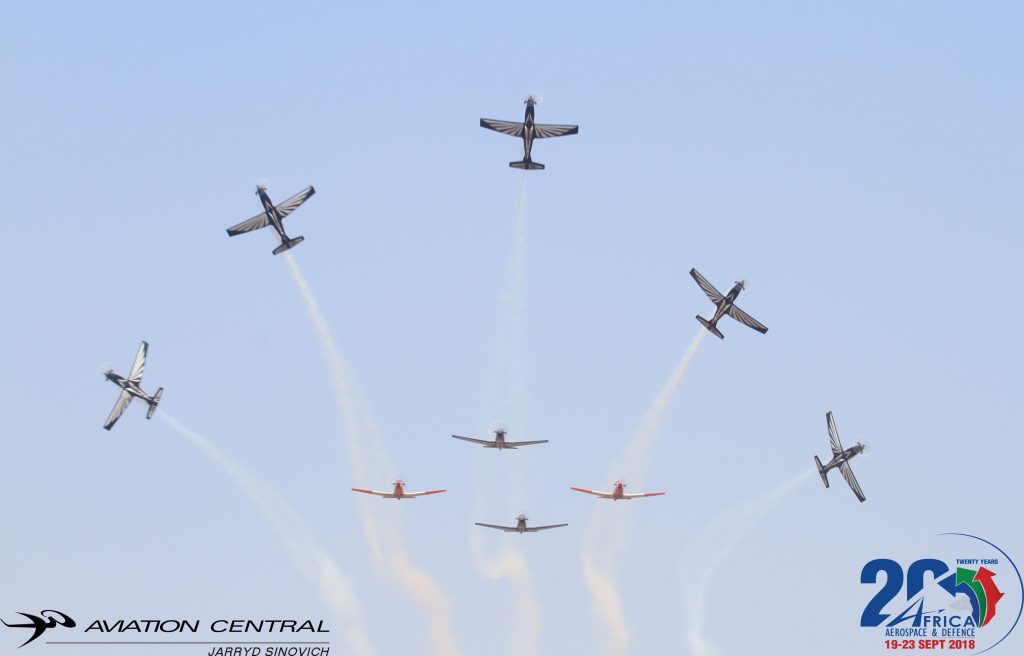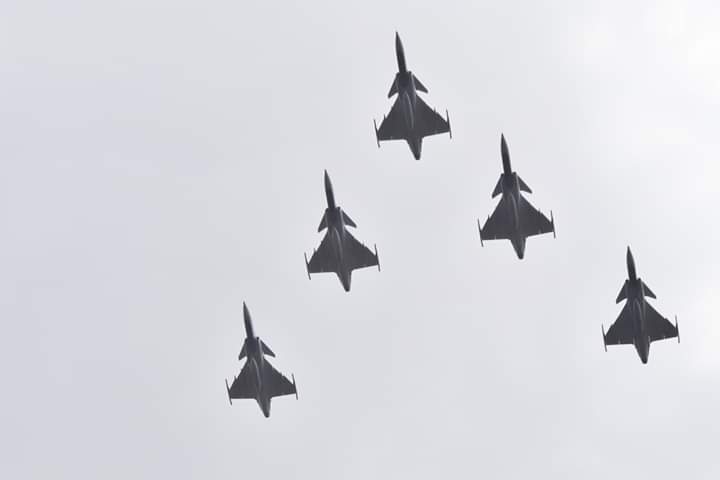Tag Archives: President Cyril Ramaphosa
Address by Commander-In-Chief, President Cyril Ramaphosa on the occasion of Armed Forces Day, Polokwane, Limpopo
Minister of Defence and Military Veterans, Ms Nosiviwe Mapisa-Nqakula,
Premier of Limpopo Province, Mr Stanley Mathabatha,
Ministers of Defence from fraternal countries,
Ministers and Deputy Ministers,
MECs,
Mayor of Polokwane and Councillors,
Secretary for Defence, Dr Sam Gulube,
Chief of the South African National Defence Force, General Solly Shoke,
Members of the Military Command Council,
Generals, Admirals, Officers and Officials,
Non-Commissioned Officers,
Members of the Diplomatic Corps,
Soldiers on Parade,
Military Veterans,
Distinguished Guests,
Fellow South Africans,
As the Commander-in-Chief of the South African National Defence Force, it is my privilege to be here today to honour our women and men in uniform.
Armed Forces Day is commemorated annually to pay tribute to the soldiers who perished in the English Channel in 1917 on board the SS Mendi during the First World War.
We honour the women and men who protect our borders, and those who have gone before who made the ultimate sacrifice in defence of our nation.
We are proud of the progress we have made in ensuring that from the disparate apartheid-era armed forces a single, united, uniquely South African National Defence Force has emerged.
The SANDF is an enduring symbol of our rainbow nation, and includes in its ranks black and white, men and women.
Through loyalty and discipline, in defending our territorial integrity and sovereignty, though your involvement in conflict resolution and peacemaking efforts on the continent, and through your heroic roles during natural disasters both at home and in our neighboring countries, the SANDF indeed makes us proud to be South African.
Only ten days ago, we commemorated the 30th anniversary of the release of the SANDF’s first Commander-in-Chief, President Nelson Rolihlahla Mandela.
We should not forget that historic day, which dramatically changed our country’s political trajectory and led to the peaceful transition to democracy and which brought the SANDF into existence.
We mark Armed Forces Day this year at a time when South Africa has assumed the chairship of the African Union for 2020.
This is a great responsibility to lead our continent towards the peace, unity and prosperity envisaged many years ago by our forebears like Kwame Nkrumah, Julius Nyerere, Patrice Lumumba, Albert Luthuli, Oliver Tambo, Thomas Sankara and Kenneth Kaunda.
In May this year, South Africa will host the Extra-Ordinary Summit of the AU on ‘Silencing the Guns’, one of the pillars of the AU’s Agenda 2063.
This Summit will provide an opportunity to assess the implementation of the AU Master Roadmap, and at the same time respond to emerging developments on the African peace and security landscape.
As a continent, we have set milestones towards the attainment of a better and safer continent for all Africans, but our progress remains mixed.
Conflict continues in several African countries, undermining our collective efforts to achieve peace and security.
South Africa looks to the SANDF to assist us to meet our obligations with regards to supporting continental peace and security.
On this 2020 Armed Forces Day, we remember all the heroes and heroines in the SANDF who serve us without any expectation of reward, and who put their lives on the line to serve their country and their continent.
In our quest to Silence the Guns, we acknowledge the enduring challenges of armed conflict in Mali, Burkina Faso and Niger, in North Africa, in the Sahel, in the Horn of Africa and in the Great Lakes region.
We count on the SANDF as an organ mandated by the AU and the UN respectively to discharge the important responsibility of promoting peace.
I commend our soldiers for staying true to this cause despite the many challenges they face.
On this Armed Forces Day, we show appreciation for the service rendered by our soldiers, who despite limited numbers, ensure that the 4,800 kilometres of our vast border is patrolled.
The companies deployed along the South Africa border with Zimbabwe, Botswana and Mozambique continue to make great strides in curtailing illegal actions in their areas of responsibility.
These men and women do remarkable work in safeguarding our borders and in assisting the South African Police Service with crime prevention.
We commend them, knowing that the vast stretch of our border requires far more resources on the ground.
As a nation, we owe a great debt of appreciation to our National Defence Force for being not just a fighting force, but a developmental force.
Across our country, we have seen the SANDF render essential services through the deployment of health professionals at public health facilities that are in crisis.
We have seen our men and women in uniform repair sewage infrastructure along the Vaal River and in the North West.
Our forces have built bridges in rural areas to give isolated communities access to places and services they would not be able to reach otherwise.
And our forces are active in fire-fighting as well as mountain and maritime search-and-rescue operations.
In undertaking these diverse programmes, the South African National Defence Force draws on the talents and energy of young South Africans.
The Military Skills Development System is an important front in our nation’s battle against youth unemployment.
I am therefore pleased that the programme for the 2020 Armed Forces Day included a military careers showcase.
I hope that young people who wish to develop themselves and grow South Africa will embrace these opportunities through which they will make an important contribution to the security and sustainability of our nation.
We recognise that we have come a long way in the past 25 years.
We have to continue growing our defence industry, especially as it makes a significant contribution in the country’s economy.
To strengthen the relationship between the defence industry and the armed forces, we have launched the National Defence Industry Council.
This development aims to support the defence industry with export opportunities while also meeting the SANDF’s material needs.
We have also launched the Defence Industry Fund, with the objective of growing the local defence industry and servicing the SANDF and external clients.
We are starting to see the fruits of this intervention in our military.
Our Armaments Corporation, Armscor, is also integrally involved in these processes and continues to provide major acquisition and project management capabilities.
South Africans should be proud that their military is providing opportunities to small businesses and contributing to the stimulation of local economies where bases are situated.
This we have done through Project Koba-Tlala.
To this effect, the SANDF has entered into a Memorandum of Understanding with the Department of Small Business Development to raise the department’s spend on small and medium enterprises from 30% to 50%, and create a lifeline for start-ups and budding entrepreneurs.
I challenge you to ensure that women-owned businesses access a significant chunk of this procurement in line with the call by the AU for the allocation of at least 25% of public procurement to women-owned businesses, instead of the current 1%.
Compatriots,
I want to commend Minister Mapisa-Nqakula for establishing the Ministerial Task Team against Sexual Exploitation and Abuse in the military.
The Task Team is currently hard at work to rid our military of incidents of sexual exploitation and abuse, which go against the grain of our military ethos and character, and which violate the very principles on which our democracy is founded.
These are steps in the right direction to address the disgraceful behaviour of a few men and which will give weight to our efforts to end violence against women on our continent.
During our tenure as African Union chair, we will make the adoption of the AU Convention on Violence Against Women a priority, and urge member states to ratify international protocols that outlaw gender discrimination.
The global climate crisis threatens our continent more than most, contributing to resource scarcity and instability.
It has the potential to aggravate security issues.
As Chair of the Committee of African Heads of State and Government on Climate Change, I will ensure that South Africa prioritises mitigation, adaptation and support.
As Commander-in-Chief, I will keenly follow the initiative that the Defence Minister took with the campaign to ‘Plant Trees Not Bombs’ in Durban in November 2019.
The UN Under-Secretary-General, Fabrizio Drummond, was also part of this initiative and urged UN members to plant 75 million trees as part of mitigating climate change, also in commemoration of the 75th anniversary of the founding of the UN.
I urge the SANDF to expand this initiative in partnership with other government entities.
As I conclude, I wish to pay tribute to one of our own, the late Chief of the South African Army, Lt-Gen Thabiso Mokhosi, who we laid to rest in December 2019.
He would have been with us today.
In his memory, let us continue serving this country loyally, and redouble our efforts to ensure that South Africans feel safe and remain safe.
I thank you.
Official Opening of AAD 2018
Official Opening of AAD 2018
The Africa Aerospace and Defence (AAD) is Africa’s only aerospace and defence expo that combines both a trade exhibition and an air show. Held biennially in the City of Tshwane – South Africa’s administrative capital, the AAD Expo is one of South Africa’s largest contributors to the country’s GDP in show years, and is regarded as a national asset.

This show dates back to when DEXSA 1975 ,The Africa Aerospace and Defense (AAD) Expo was born from the Aerospace Africa civilian exhibition that originates from the 1975 Lanseria Air Show and the DEXSA military exhibition.
The first in the series of aviation exhibitions titled “Aviation Africa.”
The show was opened by a 21 gun salute and a flypast by three Agusta A109LUH,the president Cyril Ramaphosa then addressed the crowd with the following:

Agusta A109LUH flag flypast

Agusta A109LUHs

“South Africa views the role of the military in the modern context as a developmental force, both nationally and continentally”, this is the view from President Cyril Ramaphosa in his opening address of the 10th Africa Aerospace and Defence exhibition, taking place from 19 to 23 September at the Waterkloof air force base in Pretoria.

President Cyril Ramaphosa
According to the President, the show brings defence agencies and defence industries together in reflections on the evolution of security – and how they must each adapt to the requirements of the future.
“Improved security attracts investment, encourages growth and promotes development. In support of continental economic development, the SANDF forms part of the continental military intervention capability, in the form of regional intervention forces, as well as the centralised capability under direct control of the African Union. He argued that the South African National Defence Force ought to involve itself, with African partners, in peace missions to improve security in strife-torn regions. These intervention capabilities can reduce the risk of major interstate conflict and civil war.”
“From a national perspective, the development role of our defence force implies involvement in border safeguarding, adding that South Africa’s border safeguarding operation, Corona, also focuses on preventing the illegal exploitation of national resources.”
As far as internal security is concerned, the defence force must always be ready to provide additional capacity to maintain order and stability within the relevant governance framework.
“A defence force that is a developmental unlocks substantial peace dividends for states and effectively reduces the investment required in defence over time.”

Whilst the government continues to prioritise socio-economic objectives that provide the best possible future for the youth, he was adamant that the economy is under pressure pointedly saying the means available in the fiscus are finite.
The President acknowledged that the South African National Defence Force was adapting to this economic reality.In this regard, the SANDF was prioritising within the implementation of the Defence Review by focusing on the core roles of the defence force. He said several ideas were being explored to modernise the funding model of defence and reduce its dependency on the fiscus. Still, for both security and developmental reasons, South Africa was looking after its defence industry.
“It is a national asset that has value for many departments and agencies of government,” he said. “It innovates products for the greater economy, such as systems that improve the safety of railway lines or improve the efficiency of shark nets. The common TV decoder in widespread use in South Africa is based on the intellectual property from a military technology project.”
The President noted the industry’s role as an important employer and an incubator of scarce skills in science, technology, engineering and mathematics.
“Some of our aircraft-related businesses are expanding in a highly competitive environment as suppliers to the biggest players in the global aircraft industry.” The industry is a steady earner of foreign exchange by delivering to the world leading products such as the Husky vehicle for detecting explosives and improvised explosive devices.”

In support of the industry, he outlined the many initiatives to maximise the value of the defence industry, notably the Defence Industry Strategy developed by the National Defence Industry Council, a Defence Sector Charter developed to open space for private participation by small and medium black enterprises and a defence industry fund that was launched in June this year as a funding mechanism for industry.
Government intends to support the industry to become export-driven on the back of international investment, by having a policy stance favouring international joint ventures with local industry. He noted defence industry investment destination, South Africa combines many unique factors.
Local industry still tends to own the full supply chain necessary for conceptualising and manufacturing their end product. Unlike many international ventures, defence production in South Africa does not imply multinational interdependency.
In terms of intellectual property, South Africa is one of less than ten countries that can manufacture missiles of a certain level of sophistication. He used this as an example, saying the development of intellectual property into technology demonstrators is very cost-effective due to the exchange rate between the rand and the major international currencies.

President Cyril Ramaphosa, Minister of Defence and Military Veterans Nosiviwe Mapisa-Nqakula and General Solly Shoke Chief of the SANDF
“Many nations, from different parts of the world, have recently expressed interest in becoming involved in joint ventures with our industry. The African Aerospace and Defence exhibition offers a massive opportunity for all present to identify areas of synergy and convert them into joint ventures.”
The President concluded by saying that South Africa is interested in leveraging intellectual property into tangible products and export contracts. “We assume that the interest of our visitors here is a good return on investment and we are confident that it can be achieved.”
A flypast from nine PC7MKIIs from the Central Flying School concluded the ceremony.

Nine PC7MKIIs from Central Flying School Langebaanweg




